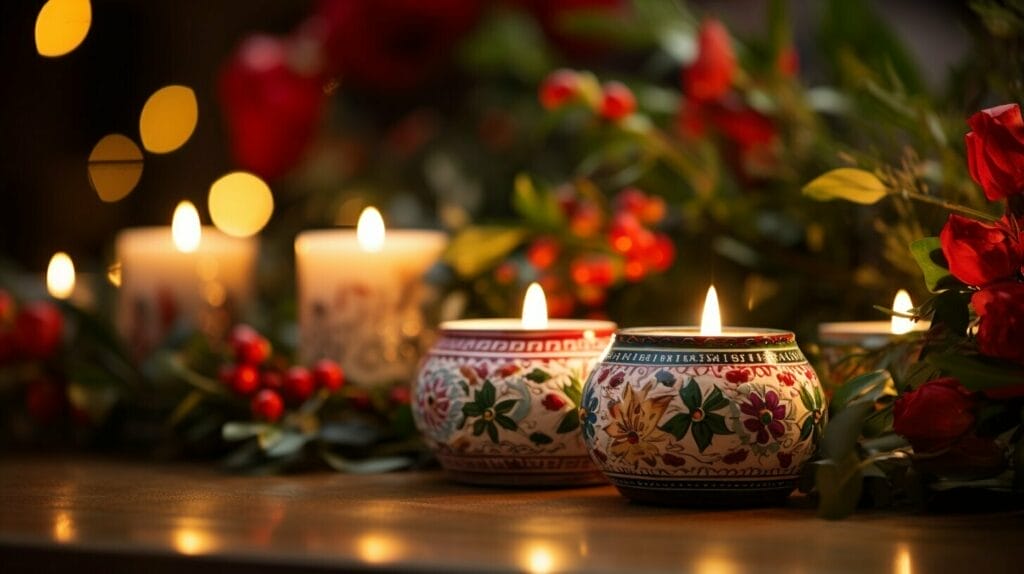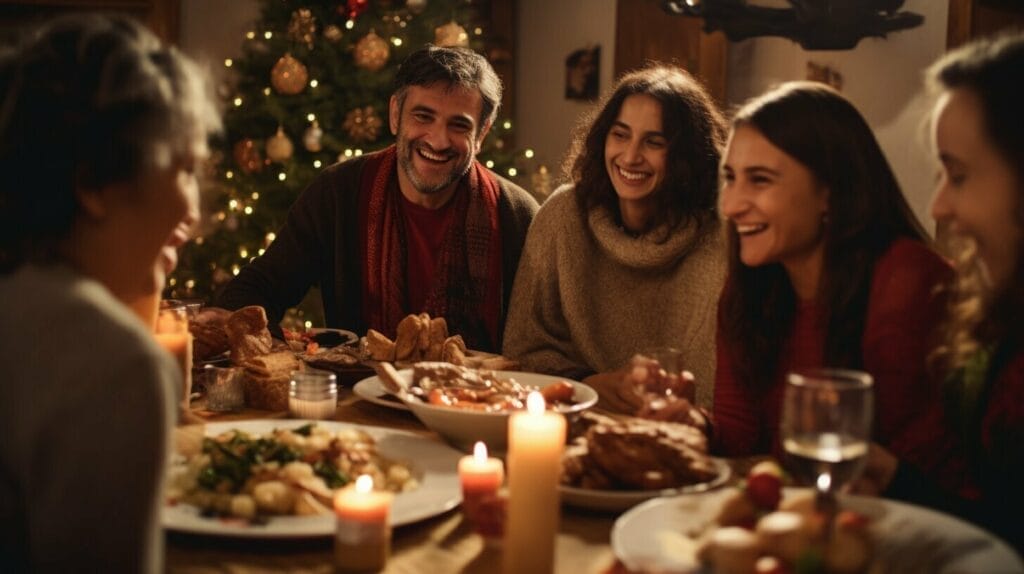Bulgarian Christmas Traditions
Bulgarian Christmas traditions are steeped in centuries of history and culture, making them unique and fascinating. The holiday season in Bulgaria is filled with customs and rituals that are cherished and passed down from generation to generation. From the 40-day Advent preparation to the Christmas Eve feast and the New Year’s Eve traditions, Bulgarians celebrate this special time of year with joy and reverence.
- Bulgarian Christmas traditions are deeply rooted in history and culture.
- The 40-day Advent period is a time of preparation and anticipation for the birth of Jesus.
- The Christmas Eve feast is a vegan meal with symbolic dishes and traditions.
- Christmas Day in Bulgaria is celebrated with a special meal and the decoration of Christmas trees.
- New Year’s Eve traditions in Bulgaria involve rituals and the consumption of banitsa.
The 40-Day Advent Preparation
The Bulgarian Christmas season officially begins on November 15th with the start of the 40-day Advent period, during which Bulgarians engage in various rituals and enjoy festive traditions. This period of preparation is a time of reflection, fasting, and anticipation for the birth of Christ.
Throughout the 40 days, Bulgarians observe rituals that are deeply rooted in their culture and religious beliefs. Families come together to light candles and say prayers, creating a warm and peaceful atmosphere in their homes. It is also common for Bulgarians to abstain from certain foods, such as meat and dairy, as a way of purifying their bodies and souls.
The Advent period is marked by several important dates and customs. On December 6th, Bulgarians celebrate St. Nicholas Day, a holiday dedicated to the patron saint of children. This day is often associated with gift-giving and acts of charity.
“The Bulgarian Christmas season officially begins on November 15th with the start of the 40-day Advent period.”
As Christmas approaches, the spirit of celebration becomes more evident. Families gather to decorate their homes with traditional ornaments, such as handmade garlands and colorful lights. The aroma of freshly baked pastries and traditional dishes fills the air, creating a sense of anticipation and joy.
Overall, the 40-day Advent period in Bulgaria is a time of deep spiritual significance and joyful anticipation. It is a time for Bulgarians to come together with their loved ones, engage in meaningful rituals, and celebrate the traditions that have been passed down through generations.
| Date | Event |
|---|---|
| November 15th | Start of the Advent period |
| December 6th | St. Nicholas Day |
Christmas Eve Feast
Christmas Eve in Bulgaria is marked by a special feast consisting of a variety of vegan dishes, including a round loaf of bread called ‘pita’ that holds a hidden coin symbolizing good fortune. This traditional meal, known as ‘Badni vecher’, is an important part of the Bulgarian Christmas celebration.
The vegan dishes served during the Christmas Eve feast are meant to honor the Orthodox tradition of abstaining from meat and dairy products on this day. The number of dishes is usually odd, often seven or nine, and they vary from region to region. Some common dishes include ‘sarmi’ (stuffed cabbage leaves), ‘bob chorba’ (bean soup), ‘tikvenik’ (pumpkin pastry), and ‘oshav’ (fruit compote).

After the feast, it is customary for the family to break the ‘pita’ bread. The person who finds the hidden coin in their slice is believed to have good luck and prosperity in the coming year. This ritual adds an element of excitement and anticipation to the meal, as everyone eagerly awaits their turn to take a slice of the bread.
To further enhance the festive atmosphere, Bulgarians often attend Midnight Mass on Christmas Eve. They gather in local churches to celebrate the birth of Christ and listen to the enchanting voices of Koledari, traditional carol singers who go from house to house spreading joy and blessings. The melodious tunes of these carols, combined with the flickering candlelight of the church, create a magical ambiance that truly captures the spirit of Christmas in Bulgaria.
| Dish | Description |
|---|---|
| Sarmi | Stuffed cabbage leaves |
| Bob chorba | Bean soup |
| Tikvenik | Pumpkin pastry |
| Oshav | Fruit compote |
“The Christmas Eve feast in Bulgaria is a joyous occasion filled with delicious vegan dishes and cherished traditions. Breaking the ‘pita’ bread to find the hidden coin brings an element of excitement, while attending Midnight Mass and listening to the enchanting carol singers create a magical experience for all.” – Bulgarian Christmas Traditions
Bulgarian Christmas Eve Feast – Table
| Dish | Description |
|---|---|
| Sarmi | Stuffed cabbage leaves |
| Bob chorba | Bean soup |
| Tikvenik | Pumpkin pastry |
| Oshav | Fruit compote |
Christmas Eve in Bulgaria is truly a special time filled with festive traditions and a vibrant culinary experience. The vegan feast, with its unique dishes and the hidden coin in the ‘pita’ bread, is a cherished part of the celebration. The joyous atmosphere is further enhanced by attending Midnight Mass and listening to the beautiful carol singers. These long-standing traditions bring families together, fostering a sense of togetherness and creating lasting memories. Embrace the Bulgarian Christmas Eve feast and immerse yourself in the rich cultural heritage of this enchanting holiday.
Christmas Day Celebration
Christmas Day in Bulgaria is a time for families to come together and enjoy a festive meal, often featuring pork as the centerpiece, and to decorate Christmas trees while following the 40-day Advent fast.
The day begins with the preparation of a traditional Bulgarian meal, which typically includes roasted pork served with various side dishes such as sauerkraut, pickles, and potatoes. This hearty feast symbolizes abundance and prosperity for the coming year.

During the meal, families gather around the table, sharing stories and laughter while savoring the rich flavors of the Christmas feast. It is a time of joy and celebration, filled with warmth and love.
After the meal, families continue with the age-old tradition of decorating the Christmas tree. Colorful ornaments, twinkling lights, and shimmering tinsel transform the tree into a magical centerpiece, symbolizing hope and new beginnings.
As the day unfolds, Bulgarians also participate in the cracking of walnuts, a beloved tradition believed to predict future fortune. Each cracked walnut shell reveals a hidden message or symbol, offering insights into what the year ahead may hold.
In conclusion, the celebration of Christmas Day in Bulgaria is a time of coming together, feasting, and creating cherished memories. It is a day filled with traditions that honor the past and embrace the future, bringing joy and happiness to all.
New Year’s Eve Traditions
New Year’s Eve in Bulgaria is marked by special traditions, such as eating banitsa with lucky charms and taking part in rituals like Koledari and Survakari, continuing the festive spirit of the Christmas season. Banitsa is a traditional pastry made with layers of filo dough and filled with various ingredients like cheese, spinach, or pumpkin.
It is believed that the lucky charms hidden inside the banitsa bring good fortune and prosperity in the new year. This delicious and symbolic dish is enjoyed by families and friends as they gather to bid farewell to the old year and welcome the new one.
The participation in rituals like Koledari and Survakari adds a touch of magic to the New Year’s Eve celebration. Koledari are carol singers who go from house to house, spreading joy and good wishes for the upcoming year. They wear traditional costumes and sing traditional songs, filling the streets with a festive atmosphere.
Survakari, on the other hand, are ritual performers who visit homes, dressed in colorful costumes and masks, and perform dances and rituals to ward off evil spirits and bring good luck. These rituals are deeply rooted in Bulgarian folklore and are believed to bring blessings and protection to the household.
As the clock strikes midnight, Bulgarians gather outside to witness fireworks lighting up the sky, signaling the start of the new year. The air is filled with laughter, cheers, and the sounds of firecrackers. Families and friends embrace and exchange warm wishes, while raising a toast with sparkling wine or rakia, a traditional Bulgarian brandy. It is a time of celebration, hope, and the anticipation of new beginnings.

This image captures the joyful spirit of Bulgarian New Year’s Eve traditions. As the clock strikes midnight, people come together to celebrate and welcome the new year with open hearts and joyous festivities. The image shows a group of people raising their glasses in a toast, surrounded by colorful fireworks, symbolizing the excitement and optimism that comes with the start of a new chapter.
| Traditions | Description |
|---|---|
| Banitsa | A traditional pastry made with filo dough and filled with various ingredients. Lucky charms are hidden inside to bring good fortune. |
| Koledari | Carol singers who go from house to house, spreading joy and good wishes for the new year. |
| Survakari | Ritual performers who visit homes, dressed in colorful costumes and masks, to ward off evil spirits and bring good luck. |
Traditional Bulgarian Christmas Eve Dinner
A traditional Bulgarian Christmas Eve dinner is a feast for the senses, featuring dishes like Christmas bread, bean or pea pottage, rice with vegetables, roasted potatoes, and an array of fruits and salads, symbolizing abundance and prosperity.
The centerpiece of the meal is the round loaf of bread called ‘pita’, which is traditionally prepared with a hidden coin inside. The person who discovers the coin in their slice is said to be blessed with good luck and fortune for the coming year.
In addition to the delicious food, the Christmas Eve dinner holds deep cultural significance. The vegan dishes represent the observance of the Orthodox 40-day Advent fast, which is a period of spiritual preparation leading up to the birth of Christ on December 25th.
After enjoying the meal, many Bulgarians choose to attend Midnight Mass, where they participate in the sacred ceremony and listen to the enchanting melodies of carol singers known as Koledari. These singers wander from house to house, spreading joy and good wishes for the holiday season.
Overall, the traditional Bulgarian Christmas Eve dinner is a time-honored tradition that brings together family and friends to celebrate the holiday with a bountiful, tasty feast. It is a cherished moment of togetherness and reflection, as Bulgarians express their gratitude for the blessings of the past year and eagerly anticipate the joys and possibilities of the year to come.
FAQ
Q: What are some Bulgarian Christmas traditions?
A: Bulgarian Christmas traditions include celebrating on December 25th, preparing for Christmas with a 40-day Advent starting on November 15th, and eating a special meal on Christmas Eve.
Q: What is included in a traditional Bulgarian Christmas Eve meal?
A: The meal consists of an odd number of vegan dishes, with a round loaf of bread called ‘pita’ containing a hidden coin.
Q: Are there any special activities or customs on Christmas Eve in Bulgaria?
A: After the meal, some Bulgarians attend Midnight Mass and listen to carol singers called Koledari.
Q: How is Christmas Day celebrated in Bulgaria?
A: On Christmas Day, another big meal is served, usually with pork. Other traditions include decorating Christmas trees, following the Orthodox 40-day Advent fast, and cracking walnuts to predict future fortune.
Q: Are there any New Year’s Eve traditions in Bulgaria?
A: Yes, the New Year’s Eve tradition includes eating banitsa with lucky charms and participating in rituals like Koledari and Survakari. There are also similarities with Christmas traditions.
Q: What is a traditional Bulgarian Christmas Eve dinner like?
A: A traditional Christmas Eve dinner in Bulgaria includes Christmas bread, bean or pea pottage, rice with vegetables, roasted potatoes, and various fruits and salads.




